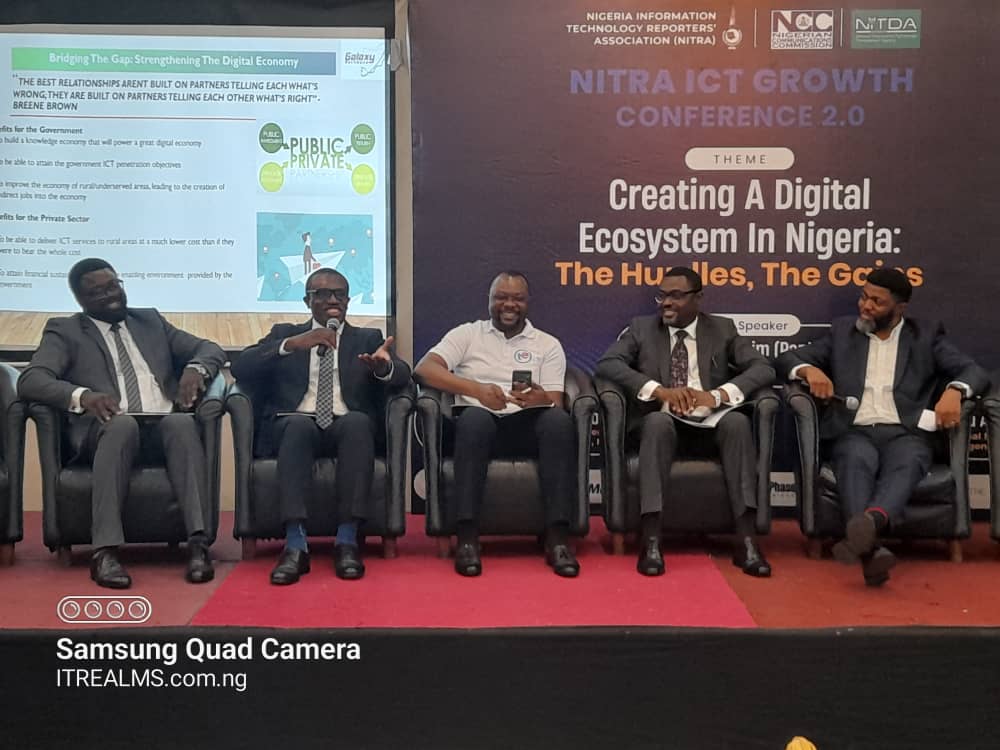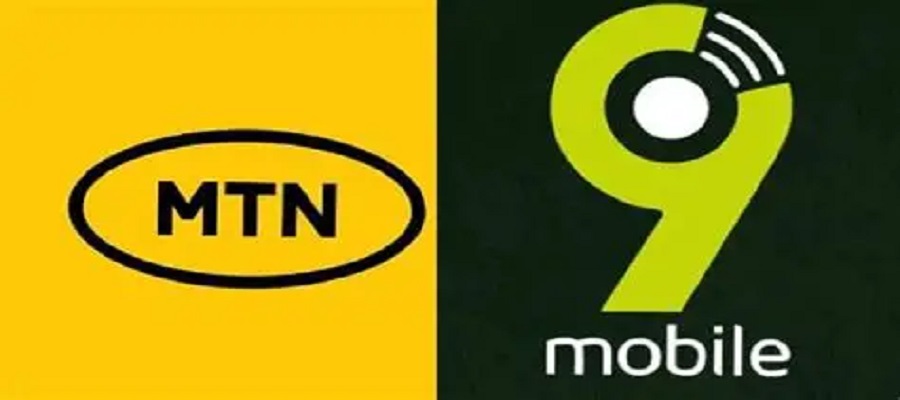Telecom
ICT Experts Harp On The Critical State Of Infrastructure Needs In Nigeria

Panelists at the just concluded NITRA ICT Growth Conference 2.0, have emphasized the need for an urgent review of Nigeria’s state of infrastructure so as to position the country to massively reap the benefits of a digital economy as obtained in some developed nations of the world.

Themed ‘Creating a Digital Ecosystem in Nigeria: The Hurdles, The Gains,’ the panelists drawn from both the public and private sector establishments, were of the consensus that infrastructure provisioning remained Nigeria’s surest pathway to building a robust digital economy.
At a second panel session during proceedings at the NITRA flagship technology conference held at the Oriental Hotel, Lekki Lagos, and moderated by Mr. Peter Oluka, Editor of TechEconomy.ng, the panelists agreed that efforts at building Nigeria’s digital economy cannot yield the much-desired fruit unless there is sustained commitment on the part of the government to prioritise the provision of infrastructure.
Seyi Olarenwaju, CFO of Medallion Data Centre said infrastructure is going to play a vital role in enhancing digital systems in Nigeria’s digital ecosystem, noting that “if there is no infrastructure in place, there is nothing.”
He stated that since governance has now been replaced by electioneering campaigns in preparation for the 2023 general election, the incoming administration should be focused, identify a particular infrastructure, and fix it, and expressed the hope that if in this regard, power is given priority attention, a lot of things will follow suit.
Kelechukwu Nsofor of Rack Centre, a carrier-neutral Tier III data centre who spoke from a data centre provider’s perspective, said power is the key infrastructure that drives a data centre business, describing it as basically the livewire of any data centre.
According to Nsofor, “The key infrastructure that we rely on is power. Power is basically the livewire of any data centre. Unfortunately, if you go back to 1999 since we started the current democratic dispensation in the country, what has been the installed capacity in terms of power? 20 years down the line, where are we today in terms of power?
“At a point, we were generating 1600MW, today, it’s still hovering around 3000MW. Where does that leave us as an economy of over 200 million people? So, if you look at the population growth rate and try to compare it with what we are growing in terms of power, you see that there’s a total disconnect.”
He said that Nigeria is blessed with a rich reservoir of policies and knowledge expertise but expressed worries that this has not been translated to results in the country’s power industry.
“Now, tying that to Rack Centre and indeed the data centre space, we have been generating our own power in the last nine years that we have been operating. And we’ve been fully in control of generating that power now. As we look to expand, we are also looking at ways where we can continue to generate power or do it more cost-effectively.
“We would like a situation where the government will actually stop the lip service that goes into infrastructure like power and actually start showing serious commitment by playing a major role in the provisioning of power infrastructure,” he said.
Noting that the digital economy is all about using the internet basically to push economic activities, Nsofor stated that what is critical even with the efforts at bringing in foreign direct investment, all the marine cables sitting on the coast of Lagos, is how to work with the private sector and knowledge experts basically on how to get things like multiple taxations and right of way out of the road.
“Operators can now push that capacity where it is actually needed. This will help us increase internet penetration, increase the digital economy growth, and push the economy forward,” he concluded.
In his contribution to the discourse, Babalola Olalekan of Phase 3 Telecoms admitted that the government was doing enough to provide infrastructure but stated that there was a need for stronger synergy between the government and service providers.
“There was a document released last year called Strategic Roadmap/Action Plan: A four-year plan 2021-2024. The key performance indices released in that document classified infrastructure in such categories as soft, service and hardware.
“When you look at the hardware infrastructure, we talk about how far we’ve gone in hardware infrastructure deployments like fibre cables. We talk of active devices and so on and so forth. But there’s something the government has put in place especially at the federal level by cutting down right-of-way charges all over the federation.
“Another area we have taken advantage of is the concession plan we call public-private partnership (PPP), where I expect the operators and players to key into and take advantage of our existing infrastructure, and opportunities.
“Another thing I will encourage we should be doing is a collaboration among players. All of us can only fight about a particular position or location. We can join hands on how to collaborate, leverage each other, and supply as a single network.
“So, I think the government is doing enough with policies. The onus is on us to tap into it, put more pressure on the government and be more up and doing in our collaborative efforts and take advantage of what is available to us through the government,” Olalekan said.
He said that going into the 2023 election, the most important thing to be focused on is security, stating that operators have many works to do out there in the field yet, they find it difficult to restore the network in the shortest possible time. “So, whatever government can do to make sure that our roads, our villages, our towns are secured, we will surely have a good general election.”
Chidi Okpala of Galaxy Backbone, in his intervention, acknowledged the fact that government understands the importance of infrastructure in growing the country’s digital economy, noting that one of the things the current administration holds dear to its heart, is infrastructure.
“Have they done all the things expected of them as government? Maybe not. But have they made some efforts in bridging the infrastructure gap? The answer is yes. But there is a whole lot of learning, a whole lot of training in trying to create that awareness, into fully understanding how this impacts the day-to-day living of everyone.
“As an organisation, what we are trying to do is to bridge that gap of understanding especially, people in leadership level in government; to let them understand this is what this infrastructure stands for, this is what it is all about. It is not just for sending emails but how it affects your life, your family, and the work that you do.
“We have done quite a lot together with some of the other organisations within the information technology space in the public sector. We are still doing a lot to raise that awareness of what this infrastructure means so that people can understand more and collaborate more.
“Collaboration is the key, talking about the benefits and not dwelling more on talking about the problems because sometimes when we do that, we cloud ourselves of the opportunities around us,” he said.
Okpala expressed the need for policymakers to be much more intentional about what the country is doing, how it the affects everyone, and how the efforts at building the country’s digital economy can be sustained.
The session, which was anchored by the Editor of TechEconomy, Mr. Peter Oluka, was unanimous with its position that infrastructure is the bedrock of ICT development and global competitiveness in Nigeria.
Telecom
NCC, REA Move to Power Telecoms with Renewable Energy

Nigerian Communications Commission (NCC) and Rural Electrification Agency (REA) have teamed up to develop an initiative that will reduce the $350 million annual spending on diesel by telecom operators in Nigeria.

According to a press statement by Nnenna Ukoha, acting had of Public Affairs, NCC, this collaboration will focus on deploying renewable energy solutions to support telecom infrastructure, particularly in rural and underserved areas.
To that end, the two agencies have inaugurated what they called NCC–REA Collaboration Committee, aimed at deploying renewable energy solutions to power telecom infrastructure across the country.
According to the State of Africa’s Infrastructure Report 2025 by the Africa Finance Corporation, telecom operators in Nigeria consume more than 40 million litres of diesel every month, costing them over $350 million annually.
The statement read, “The Nigerian Communications Commission has formally inaugurated the NCC–REA Collaboration Committee, marking a pivotal step towards advancing Nigeria’s digital and energy inclusion objectives by developing modalities for the deployment of renewable energy to support telecom infrastructure in Nigeria.”
The inauguration ceremony, held on Friday, at the NCC Headquarters in Abuja, was presided over by Dr Aminu Maida, executive vice chairman and chief executive officer, NCC.
Maida was joined by Abba Aliyu, managing director of the REA, along with senior executives and committee members from both organisations.
Speaking at the event, Maida described the collaboration as a timely and strategic alignment of national priorities.
He noted that bridging the connectivity and power gaps in rural areas remains critical for Nigeria’s growth and development.
He highlighted that the demand for digital services and connected communities creates an opportunity for renewable energy to play a crucial role.
Maida further emphasised that the partnership goes beyond infrastructure; it is aimed at driving inclusion, reducing inequalities, and fostering shared prosperity.
“Whether it is powering a base station or enabling a child to access digital learning, this partnership has the potential to transform realities and bring opportunity closer to the people.
“This initiative is about more than infrastructure, it is about driving inclusion, bridging inequalities and creating the conditions for shared prosperity,” he was quoted in the statement.
He also noted that the initiative aligns with President Bola Tinubu’s Renewed Hope Agenda, which aims to ensure no community is left behind in Nigeria’s energy and digital transformation.
Aliyu, representing REA, expressed confidence in the transformative potential of the collaboration.
“This partnership will unlock sustainable development opportunities for millions of Nigerians, especially those in areas lacking traditional infrastructure,” he said.
He further emphasised that the collaboration would address both energy and connectivity gaps, benefiting those who are currently underserved.
The newly established NCC-REA Collaboration Committee will work to co-develop and implement integrated solutions that leverage renewable energy to power telecom sites.
The statement noted that the committee will also focus on sharing geospatial data to improve planning, aligning funding frameworks, and tracking the socio-economic impact of the project through clear performance indicators.
Telecom
NCC Approves MTN, 9Mobile Roaming Collaboration Deal

MTN Nigeria Communications Plc has announced the execution of a national roaming agreement with Emerging Markets Telecommunications Services Limited (9Mobile), a move that signals a major milestone in Nigeria’s telecommunications landscape.

The Nigerian Communications Commission (NCC), the industry’s regulatory authority, has approved the three-year deal, which allows 9Mobile subscribers to roam seamlessly on MTN Nigeria’s extensive network infrastructure across the country.
The agreement, effective immediately, will significantly enhance connectivity and user experience for 9Mobile customers, particularly in areas where its network coverage is limited.
By leveraging MTN’s expansive infrastructure, 9Mobile can now offer improved service reach and reliability, without duplicating capital-intensive investments in network deployment.
In a notice to the Nigerian Exchange Limited and the investing public, MTN Nigeria described the arrangement as a strategic collaboration that underscores its leadership in fostering innovation, industry cooperation, and operational efficiency.
The company emphasized that the initiative aligns with the NCC’s broader objective of promoting infrastructure sharing to improve telecommunications services nationwide.
“This agreement represents a significant step in our commitment to driving industry collaboration, improving customer experience, and supporting the NCC’s vision of a fully connected Nigeria,” said Karl Toriola, chief executive officer, MTN Nigeria.
“Delivering the scale required for telecommunications services in Nigeria requires strong collaboration between the private sector, public sector, and long-term investors. This agreement demonstrates what we can achieve when we collaborate, and we are delighted to announce it today after months of groundwork.”The national roaming deal enables subscribers from 9Mobile to access voice and data services through MTN’s network in areas where the former lacks adequate coverage.
This marks the first such large-scale, cross-network roaming arrangement between two major operators in Nigeria, setting a precedent for future cooperative efforts in the telecom industry.
MTN Nigeria highlighted that the agreement contributes to more effective use of telecommunications resources, reduces infrastructure duplication, and accelerates the expansion of mobile broadband access across underserved regions.
It also supports both operators’ sustainability objectives by maximizing existing investments and reducing the environmental impact of deploying overlapping network facilities.
“This strategic collaboration is yet another first in the country by MTN Nigeria and marks a significant milestone for the sustainability of the telecommunications industry,” the company stated.
“By enabling national roaming, MTN Nigeria is contributing to a more effective use of telecommunications resources and accelerating efforts to expand connectivity across the country.”
The agreement is expected to benefit not just subscribers and operators but also regulators and investors who have consistently advocated for policies that promote shared infrastructure and efficient capital utilization in Nigeria’s digital economy.
Uto Ukpanah, company secretary, MTN Nigeria, affirmed the company’s ongoing dedication to initiatives that create shared value.
“MTN remains committed to fostering innovation and partnerships that create sustainable value for all stakeholders while promoting digital and financial inclusion nationwide,” she noted.
With the successful rollout of this agreement, the telecoms industry is expected to see improved service delivery and expanded access to quality mobile services, especially in rural and semi-urban communities. The collaboration sets a benchmark for future inter-operator partnerships and reinforces the importance of regulatory support in advancing national connectivity goals.
Telecom
Don’t Visit Telecom Centers for Now — ALTON Warns of SIM Service Downtime

Association of Licensed Telecommunications Operators of Nigeria (ALTON) has announced a temporary disruption in SIM-related services across all mobile networks in the country.

The disruption, according to a statement on Wednesday, follows a directive from the National Identity Management Commission (NIMC), mandating mobile network operators (MNOs) to migrate to a new identity verification platform.
ALTON said the transition had triggered unforeseen technical challenges, affecting services such as SIM registration, replacement, and mobile number portability.
“While the new platform is intended to enhance the integrity and efficiency of identity management in Nigeria, unfortunately, the transition has temporarily impacted service delivery,” the association stated.
It added that MNOs would not be able to support SIM swaps, new activations, and related services until the issues are resolved.
ALTON noted that its members are working closely with the Nigerian Communications Commission (NCC), NIMC, and other stakeholders to restore normalcy.
The association appealed for public understanding and urged subscribers to delay visits to service centers for SIM-related matters.
“We sincerely apologise for the inconvenience and will continue to provide timely updates,” the statement read.
ALTON reaffirmed its commitment to delivering secure and quality telecommunications services to Nigerians.

 E-Financial2 days ago
E-Financial2 days agoAccess ARM Pensions Advocates Ways to Boost Civil Servants’ Retirement

 E-Business2 days ago
E-Business2 days agoFirm Warns as Social Media Scams Put Users’ Data at Risk

 Telecom1 day ago
Telecom1 day agoAVEVA Highlights Climate Impact Gains in 2024 Sustainability Report

 General News1 day ago
General News1 day agoAfCFTA Opens Opportunity for Logistics Sector

 Telecom2 days ago
Telecom2 days agoMTN Nigeria Launches “Mega Billion Promo” to Reward Customer Loyalty and Drive Financial Inclusion

 E-Business2 days ago
E-Business2 days agoNigeria Ranks 3rd in Africa for Ransomware Threats –INTERPOL

 Telecom1 day ago
Telecom1 day agoALTON Explains SIM-related Services Disruption Across Mobile Networks

 General News2 days ago
General News2 days agoNELFund Warns Students Against Fake Loan Portal



























